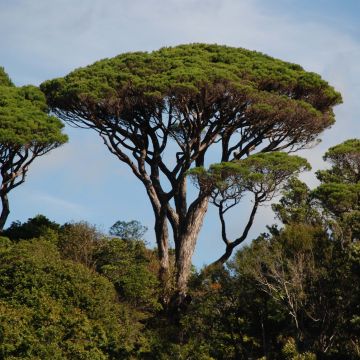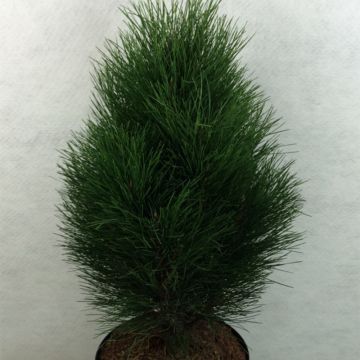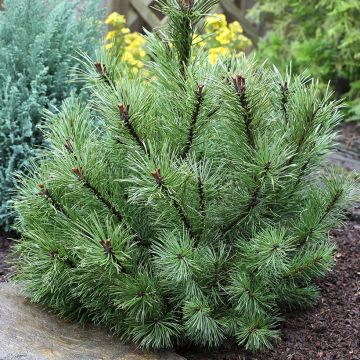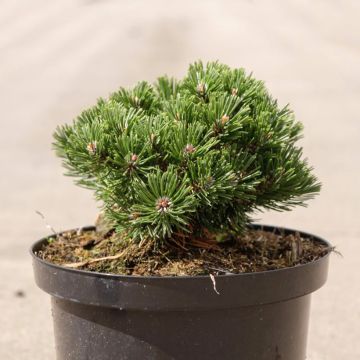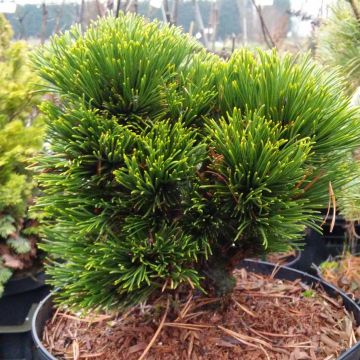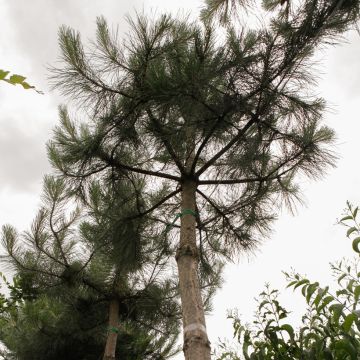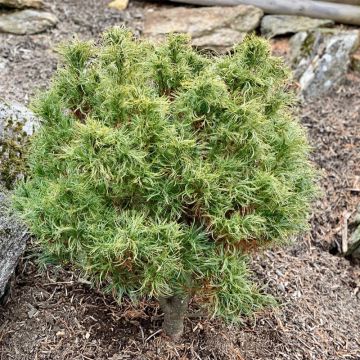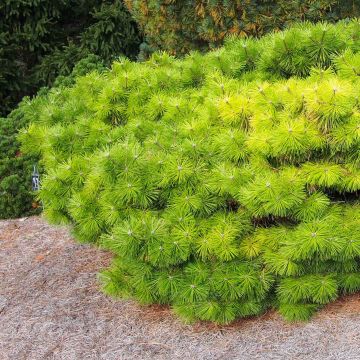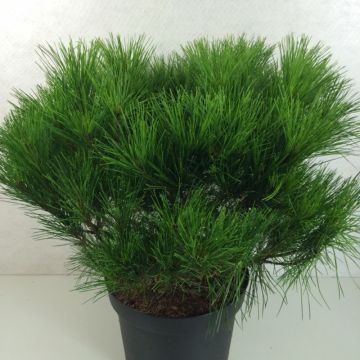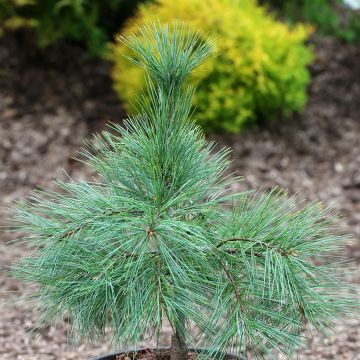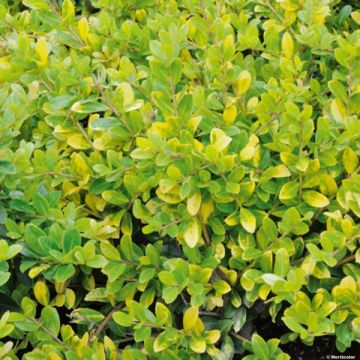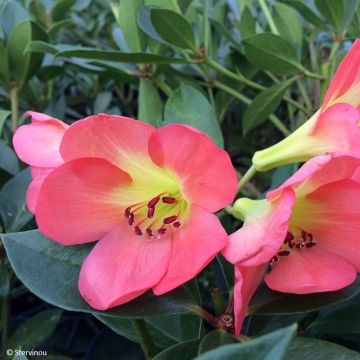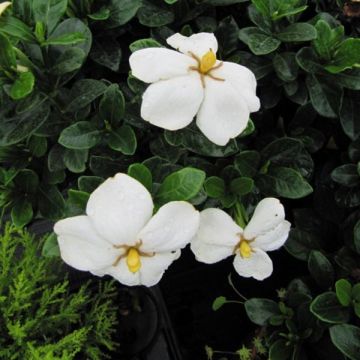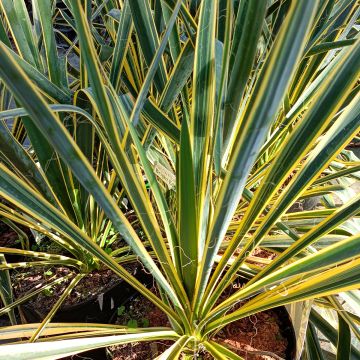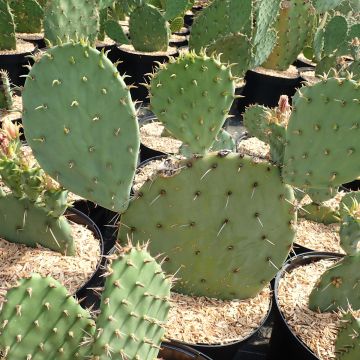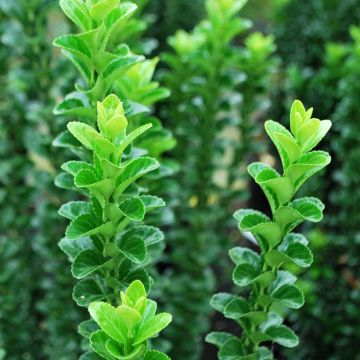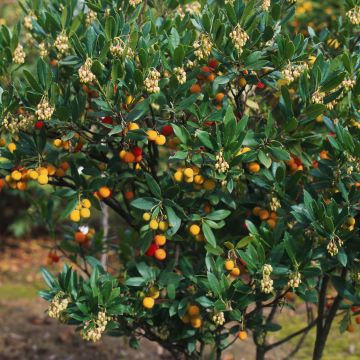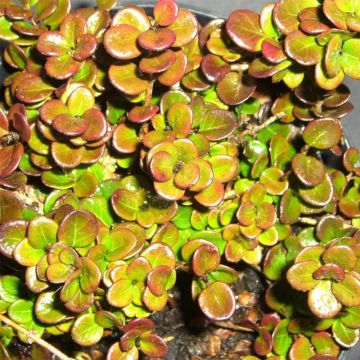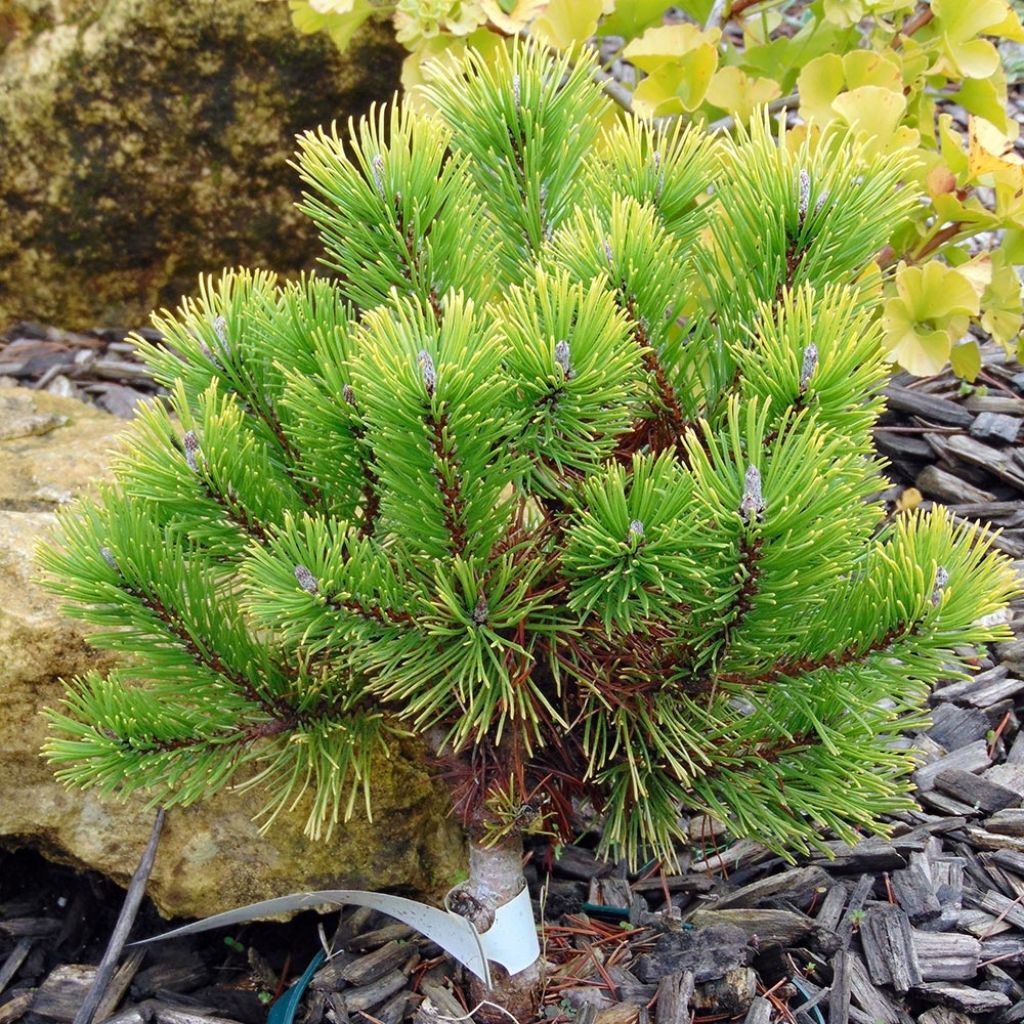

Pinus mugo Winter Gold - Dwarf Mountain Pine
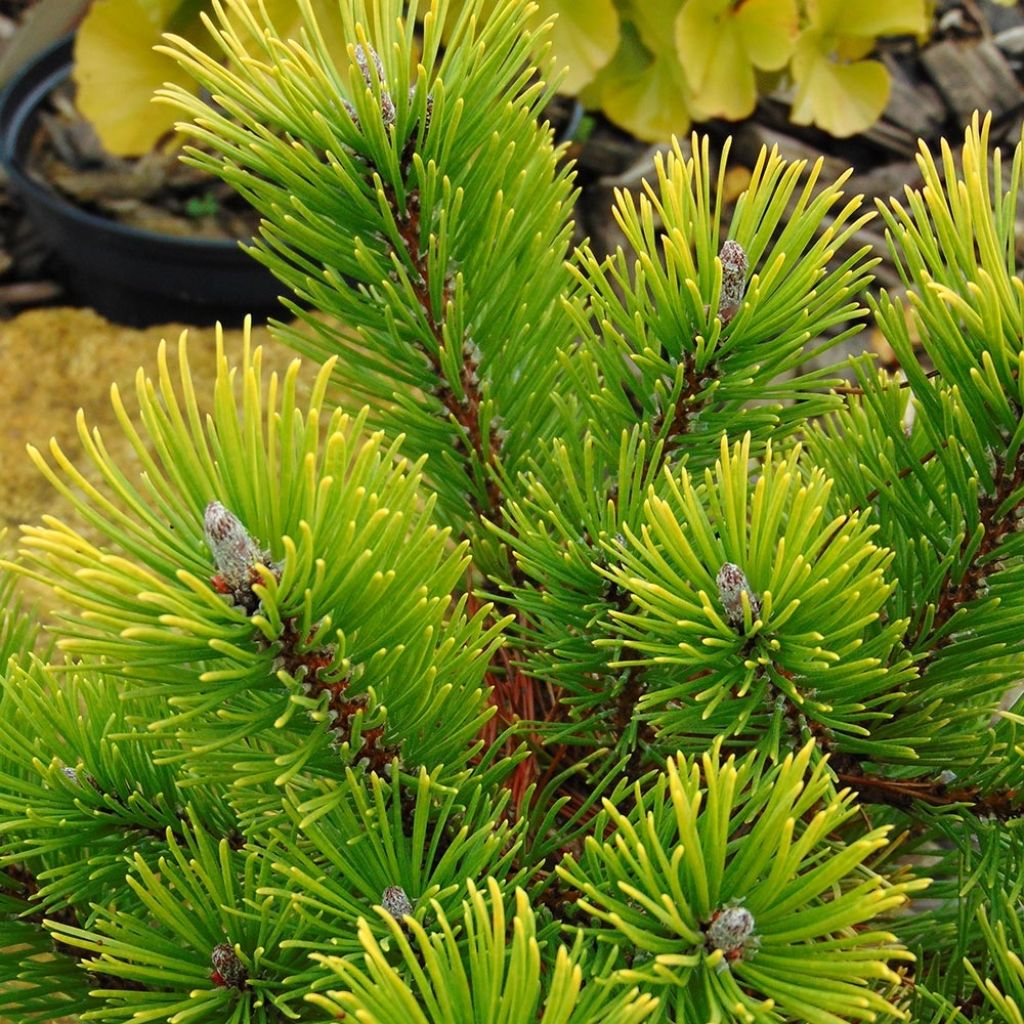

Pinus mugo Winter Gold - Dwarf Mountain Pine
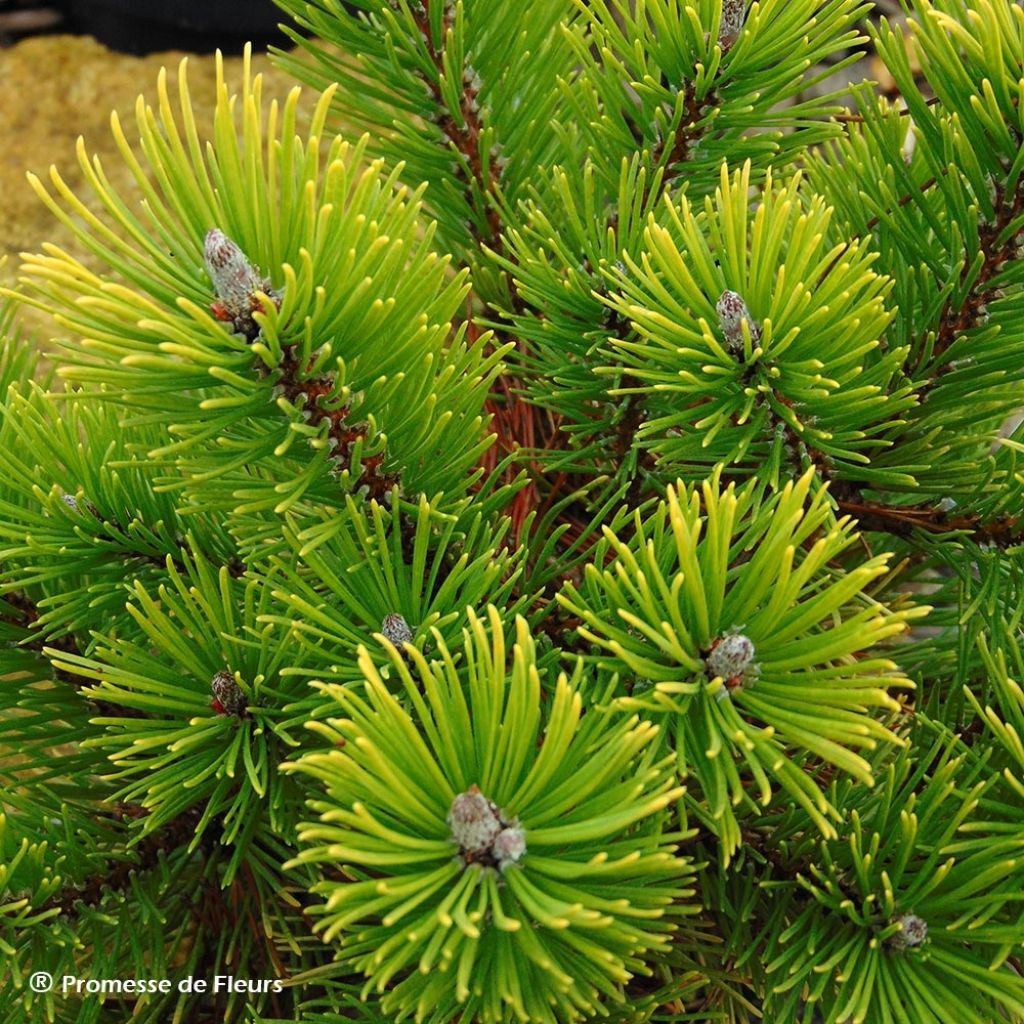

Pinus mugo Winter Gold - Dwarf Mountain Pine
Pinus mugo Winter Gold - Dwarf Mountain Pine
Pinus mugo Winter Gold
Dwarf Mountain Pine, Swiss Mountain Pine, Mugo Pine
Beautiful little pine tree with its golden tones, which I have potted to recreate a Japanese-style garden.
Didier, 18/04/2022
This item cannot be shipped to the selected country
Delivery charge from €5.90
Delivery to Corse prohibited
More information
Schedule delivery date,
and select date in basket
This plant carries a 24 months recovery warranty
More information
We guarantee the quality of our plants for a full growing cycle, and will replace at our expense any plant that fails to recover under normal climatic and planting conditions.
From €5.90 for pickup delivery and €6.90 for home delivery
Express home delivery from €8.90.
Delivery to Corse prohibited: UE law prohibits the import of this plant from mainland France to Corse as part of the fight against Xylella fastidiosa. Please accept our sincere apologies.
More information

Does this plant fit my garden?
Set up your Plantfit profile →
Description
The Pinus mugo 'Winter Gold' is a recent dwarf form of the mountain pine with slow growth. Over time, it forms a compact bushy shape, rather rounded, with dense branches covered in short, dark green needles that produce yellow shoots in spring. The entire tree turns golden yellow during winter, becoming more intense when exposed to sunlight. Original, bright and highly ornamental, it will fit well in low plant beds, as a standalone specimen, in a rockery, and will adapt well to container cultivation. It is a very hardy conifer that is not demanding and does not require pruning. It thrives in ordinary, not too dry soil and a sunny exposure.
The Pinus mugo, also known as the mountain pine, is an evergreen conifer from the Pinaceae family endemic to European mountains. It is found at subalpine altitudes, avoiding summer heat, from the Spanish sierras, through the high alpine and Pyrenean massifs, to the Balkans. It only descends to an altitude of 200 meters (656 feet 2 inches) in Central Europe. In the wild, it slowly reaches 3 to 4 meters (9 feet 10 inches to 13 feet 1 inches) in all directions, adopting a windswept silhouette that reflects its habitat. It is a very hardy species, well adapted to mountain climates.
The 'Winter Gold' variety distinguishes itself from the wild species by its reduced size, its very compact rounded bushy habit, and its magnificent golden foliage in winter. Its growth is slow, a 10-year-old specimen will not exceed 1.50 meters (4 feet 11 inches) in height and 1 meter (3 feet 4 inches) in diameter. Eventually, it will form a bush 2 meters (6 feet 7 inches) high and 2.5 meters (8 feet 2 inches) wide. Its rigid and short branches are covered in fine needles, 3 to 6 cm (1.2 to 2.4 in) long, grouped in pairs and arranged in brushes. The very decorative young shoots emerge in spring from light brown and resinous buds. On its trunk, the bark is gray-brown, while it shows a shiny green colour, then black, on the branches.
The 'Winter Gold' mountain pine will fit in all gardens, even the smallest ones, planted as a standalone specimen, in plant beds or rockeries. It can also be used in a large pot on the terrace or balcony, or left to grow freely. It works wonders in a Japanese garden and goes well with large stones, geometric lines of swimming pools, and masonry works. It can be associated with complementary grasses or dwarf conifers with a prostrate habit (Juniperus horizontalis Blue Chip), globose habit (Picea abies Little Gem), or columnar habit (Juniperus communis 'Sentinel'). The true graphic qualities of conifers naturally impose themselves in the design of a contemporary garden, which prefers the aesthetics of shapes, silhouettes, and textures over the dance of blooms. These plants, with their reassuring permanence, structurally define a plant bed, mark pathways, border the terrace, easily replacing the strong presence of trimmed boxwood or holly. The key is to play with volumes and colours.
Report an error about the product description
Pinus mugo Winter Gold - Dwarf Mountain Pine in pictures
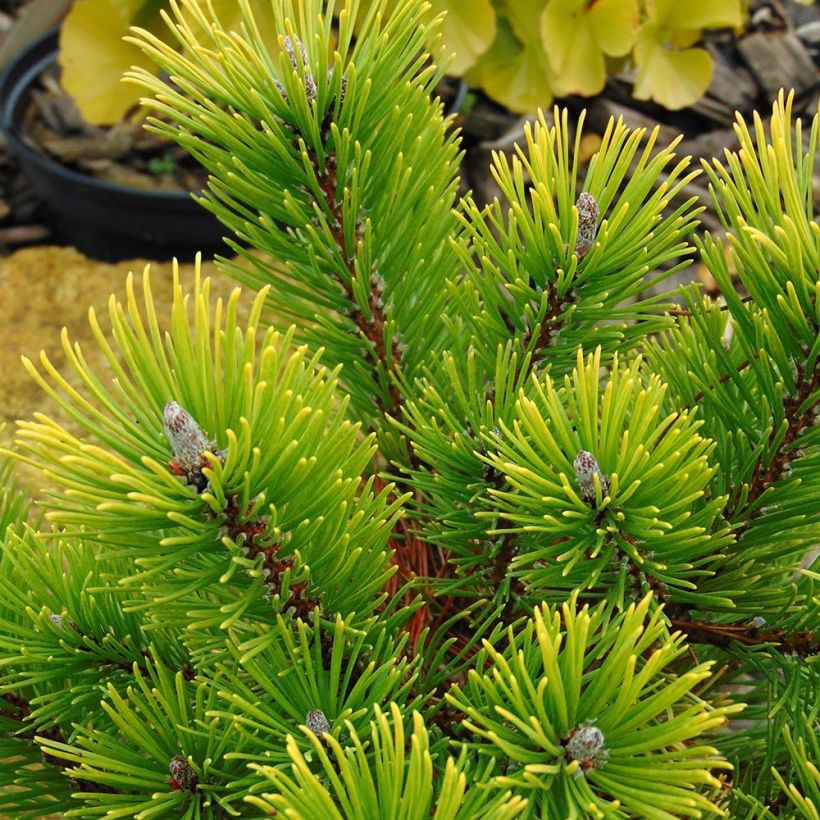

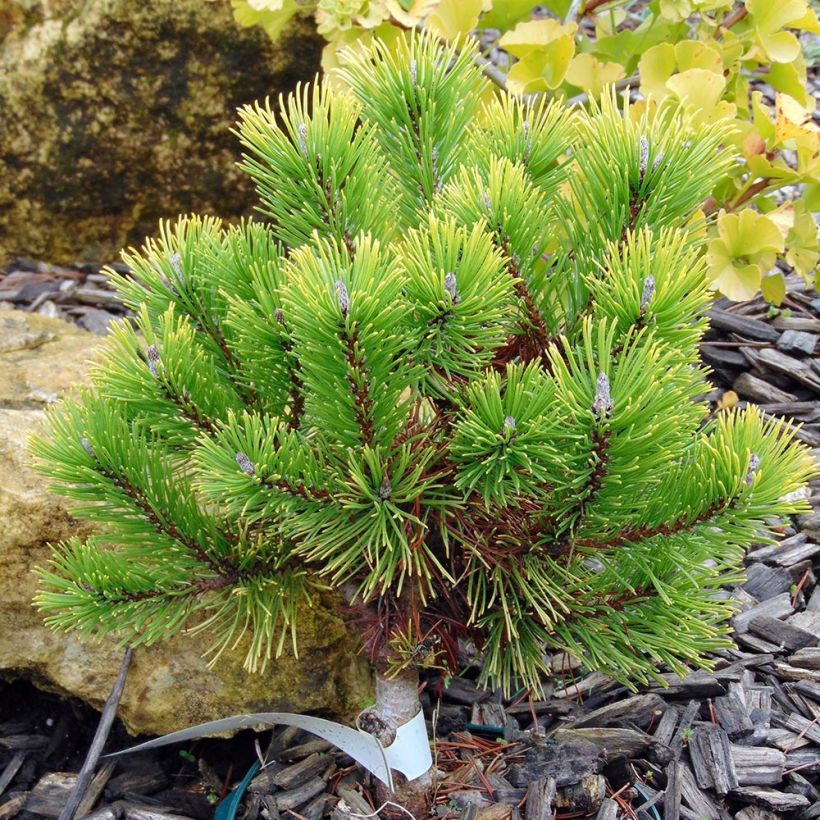



Plant habit
Foliage
Botanical data
Pinus
mugo
Winter Gold
Pinaceae
Dwarf Mountain Pine, Swiss Mountain Pine, Mugo Pine
Cultivar or hybrid
Other Pinus - Pine
Planting and care
The Pinus mugo 'Winter Gold' can be planted from September to November and from February to June in well-drained, moist, even poor soil, whether it is slightly limestone or, on the contrary, peaty and acidic. It only fears soils that are too dry in summer and scorching temperatures. Choose a sunny location or, at worst, partially shaded in hot climates. Soak the root balls well before planting. Optionally, add organic amendment at planting and water generously in the first few years, and in case of prolonged drought. You can apply a special conifer fertilizer every year in April and weed the soil in summer. This very hardy conifer (up to at least -30°C (-22 °F)) does not need to be pruned. However, you can accentuate its compact habit or keep it in very reduced proportions by annually pruning the branches by half their size, from September to November.
Planting period
Intended location
Care
-
, onOrder confirmed
Reply from on Promesse de fleurs
Evergreen shrubs
Haven't found what you were looking for?
Hardiness is the lowest winter temperature a plant can endure without suffering serious damage or even dying. However, hardiness is affected by location (a sheltered area, such as a patio), protection (winter cover) and soil type (hardiness is improved by well-drained soil).

Photo Sharing Terms & Conditions
In order to encourage gardeners to interact and share their experiences, Promesse de fleurs offers various media enabling content to be uploaded onto its Site - in particular via the ‘Photo sharing’ module.
The User agrees to refrain from:
- Posting any content that is illegal, prejudicial, insulting, racist, inciteful to hatred, revisionist, contrary to public decency, that infringes on privacy or on the privacy rights of third parties, in particular the publicity rights of persons and goods, intellectual property rights, or the right to privacy.
- Submitting content on behalf of a third party;
- Impersonate the identity of a third party and/or publish any personal information about a third party;
In general, the User undertakes to refrain from any unethical behaviour.
All Content (in particular text, comments, files, images, photos, videos, creative works, etc.), which may be subject to property or intellectual property rights, image or other private rights, shall remain the property of the User, subject to the limited rights granted by the terms of the licence granted by Promesse de fleurs as stated below. Users are at liberty to publish or not to publish such Content on the Site, notably via the ‘Photo Sharing’ facility, and accept that this Content shall be made public and freely accessible, notably on the Internet.
Users further acknowledge, undertake to have ,and guarantee that they hold all necessary rights and permissions to publish such material on the Site, in particular with regard to the legislation in force pertaining to any privacy, property, intellectual property, image, or contractual rights, or rights of any other nature. By publishing such Content on the Site, Users acknowledge accepting full liability as publishers of the Content within the meaning of the law, and grant Promesse de fleurs, free of charge, an inclusive, worldwide licence for the said Content for the entire duration of its publication, including all reproduction, representation, up/downloading, displaying, performing, transmission, and storage rights.
Users also grant permission for their name to be linked to the Content and accept that this link may not always be made available.
By engaging in posting material, Users consent to their Content becoming automatically accessible on the Internet, in particular on other sites and/or blogs and/or web pages of the Promesse de fleurs site, including in particular social pages and the Promesse de fleurs catalogue.
Users may secure the removal of entrusted content free of charge by issuing a simple request via our contact form.
The flowering period indicated on our website applies to countries and regions located in USDA zone 8 (France, the United Kingdom, Ireland, the Netherlands, etc.)
It will vary according to where you live:
- In zones 9 to 10 (Italy, Spain, Greece, etc.), flowering will occur about 2 to 4 weeks earlier.
- In zones 6 to 7 (Germany, Poland, Slovenia, and lower mountainous regions), flowering will be delayed by 2 to 3 weeks.
- In zone 5 (Central Europe, Scandinavia), blooming will be delayed by 3 to 5 weeks.
In temperate climates, pruning of spring-flowering shrubs (forsythia, spireas, etc.) should be done just after flowering.
Pruning of summer-flowering shrubs (Indian Lilac, Perovskia, etc.) can be done in winter or spring.
In cold regions as well as with frost-sensitive plants, avoid pruning too early when severe frosts may still occur.
The planting period indicated on our website applies to countries and regions located in USDA zone 8 (France, United Kingdom, Ireland, Netherlands).
It will vary according to where you live:
- In Mediterranean zones (Marseille, Madrid, Milan, etc.), autumn and winter are the best planting periods.
- In continental zones (Strasbourg, Munich, Vienna, etc.), delay planting by 2 to 3 weeks in spring and bring it forward by 2 to 4 weeks in autumn.
- In mountainous regions (the Alps, Pyrenees, Carpathians, etc.), it is best to plant in late spring (May-June) or late summer (August-September).
The harvesting period indicated on our website applies to countries and regions in USDA zone 8 (France, England, Ireland, the Netherlands).
In colder areas (Scandinavia, Poland, Austria...) fruit and vegetable harvests are likely to be delayed by 3-4 weeks.
In warmer areas (Italy, Spain, Greece, etc.), harvesting will probably take place earlier, depending on weather conditions.
The sowing periods indicated on our website apply to countries and regions within USDA Zone 8 (France, UK, Ireland, Netherlands).
In colder areas (Scandinavia, Poland, Austria...), delay any outdoor sowing by 3-4 weeks, or sow under glass.
In warmer climes (Italy, Spain, Greece, etc.), bring outdoor sowing forward by a few weeks.

































